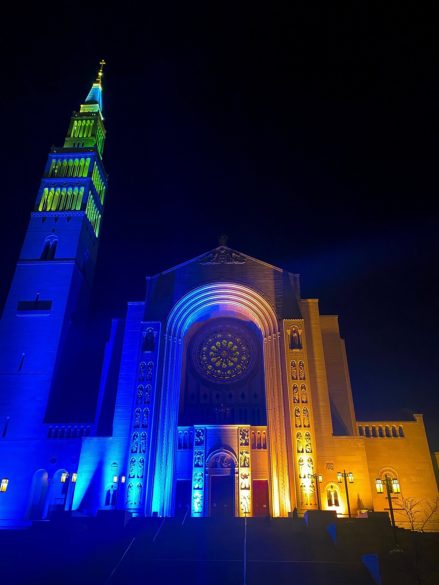
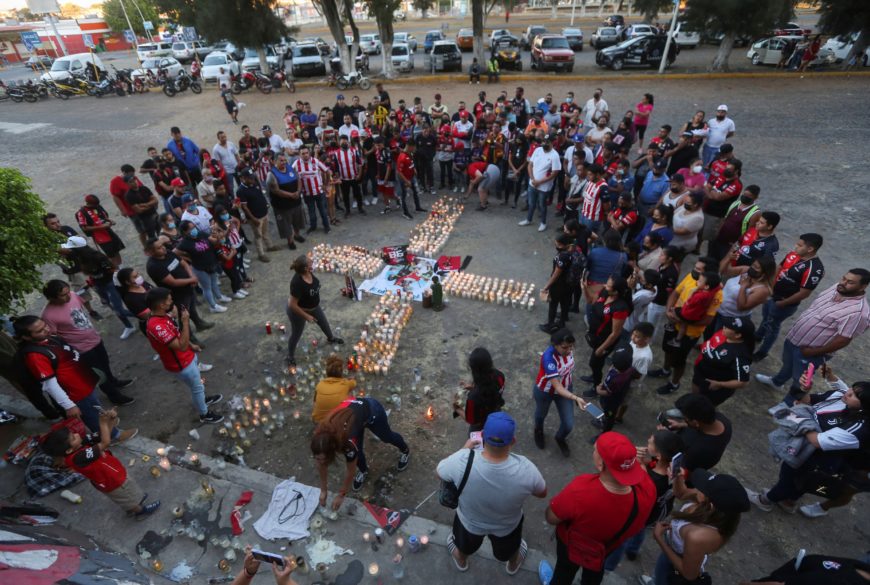
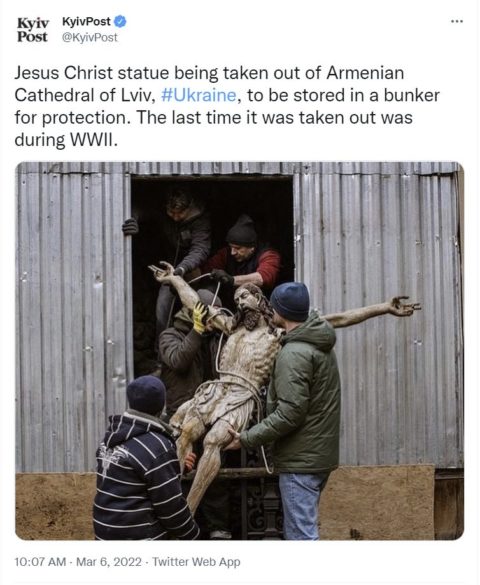
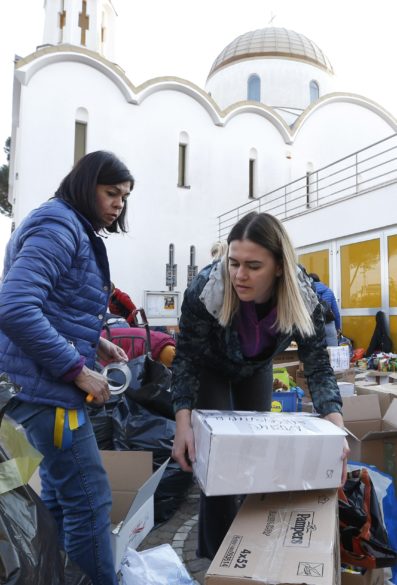
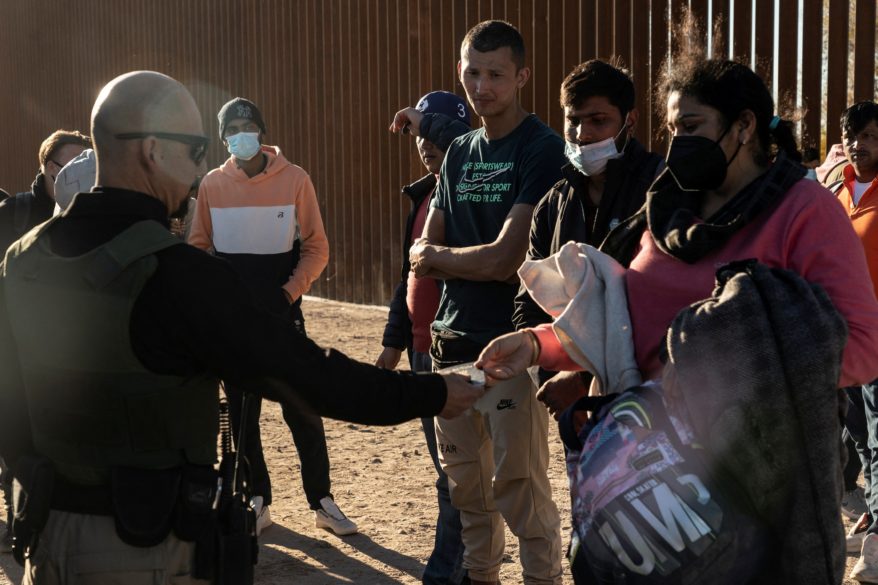







La pornografía es la mayor adicción en el mundo de hoy, y por un amplio margen. Afecta principalmente a los hombres, pero también es una adicción creciente entre las mujeres. Gran parte de esto, por supuesto, se debe a su fácil y gratuita disponibilidad en Internet. Todos ahora (incluidos nuestros propios niños pequeños) tienen acceso inmediato desde la privacidad de sus teléfonos o computadoras portátiles, y en el anonimato. Ya no tendrás que escabullirte a alguna sección sórdida de la ciudad para ver lo prohibido. Hoy en día, la pornografía está ganando una mayor aceptación en la corriente principal. ¿Cuál es el daño o la vergüenza en ello?

De hecho, ¿cuál es el daño o la vergüenza en ello? Para un número creciente de personas hoy en día, no hay daño ni vergüenza en ello. Su punto de vista es que, cualquiera que sea su desventaja, la pornografía es la liberación de la antigua represión sexual religiosa. De hecho, muchas personas lo ven como una expresión saludable de la sexualidad (sorprendentemente, esto incluye incluso a algunas escritoras feministas). Los personajes de la televisión dominante bromean sobre su colección de pornografía, como si fuera tan inocente como una colección de viejos álbumes favoritos, y tengo colegas que argumentan que nuestra resistencia a ella simplemente delata la represión sexual. El sexo es hermoso, argumentan, entonces, ¿por qué tenemos miedo de mirarlo?
¿Qué tiene de malo la pornografía? Casi todo, y no sólo desde una perspectiva moral.
Comencemos con el argumento: el sexo es hermoso, entonces, ¿por qué tenemos miedo de mirarlo? Esa lógica tiene razón en una cosa, el sexo es hermoso, tan hermoso de hecho que necesita ser protegido de su propio poder. Decir que se puede mirar como uno podría mirar una hermosa puesta de sol es ingenuo, religiosa y psicológicamente. Religiosamente, se nos dice que nadie puede mirar a Dios y vivir. Eso también es cierto para el sexo. Su misma luminosidad necesita un velo. Además, es psicológicamente ingenuo argumentar que este tipo de intimidad profunda puede exhibirse públicamente. No puede y no debe. La exhibición pública de ese tipo de intimidad viola todas las leyes de decoro y respeto por aquellos involucrados en esta intimidad y los que miran. Como todas las cosas profundamente íntimas, necesita un velo adecuado.
Luego, al hablar de la belleza del sexo y del cuerpo humano, debemos hacer una distinción entre desnudez y desnudo. Cuando un buen artista pinta un cuerpo desnudo, la desnudez sirve para resaltar la belleza de toda la persona, cuerpo y alma, incluida su sexualidad. En un desnudo, la sexualidad está conectada con la totalidad, con el alma; cuánto al contrario con la desnudez. Expone el cuerpo humano de una manera que destruye su integridad, separa su alma y escinde el sexo de toda la persona.
Cuando esto sucede, y eso es precisamente lo que sucede en la pornografía, el sexo se convierte en algo sin alma, escindido, mecánico, sin un significado profundo, bipolar, algo de lo que necesitas volver a tu ser real. Y, cuando eso sucede, toda profundidad desaparece y entonces, como escribe W.H. Auden , todos sabemos las pocas cosas que nosotros, como mamíferos, podemos hacer.
Lamentablemente, hoy para muchos de nuestros jóvenes, especialmente los niños, la pornografía es su educación sexual inicial, y es una que puede dejar una huella permanente en ellos.
Esa huella puede tener efectos a largo plazo en la forma en que entienden el significado del sexo, cómo respetan o no respetan a las mujeres y cómo captan o no el vínculo vital y conmovedor entre el sexo y el amor. La pornografía, y no solo en los jóvenes, puede dejar cicatrices difíciles de superar. El argumento en contra es que la pornografía bien puede deformar inicialmente la visión de un adolescente pero que esto se curará una vez que madure y se enamore de verdad. Mi esperanza es que esto sea cierto, pero mi preocupación es que la impronta inicial pueda, a largo plazo, manchar la forma en que una persona se enamora y especialmente cómo entiende la reciprocidad radical que se le pide al sexo en el amor. Tal es el poder potencial de la pornografía.
Más allá de todo esto, se podría argumentar con fuerza que la pornografía (en su producción y visualización) es violencia contra la mujer y que la pornografía sutil y no tan sutilmente promueve la violencia contra la mujer. Finalmente, en una cultura que se enorgullece sobre todo de su sofisticación y liberación, sobre todo de su liberación de muchos de nuestros antiguos tabúes religiosos, uno duda incluso en mencionar la palabra “castidad” en este contexto. ¿Se atreve uno a decir que la pornografía es mala porque es la antítesis misma de la castidad? ¿Se atreve uno a usar la castidad como argumento cuando en su mayor parte nuestra cultura desdeña la castidad, la compadece y reserva un cinismo particular para los grupos religiosos que aún defienden el viejo adagio, “guárdalo para tu cónyuge”? Peor aún, es el cinismo de hoy frente a la idea de permanecer castos para Jesús.
Pero, la idea de la castidad incrusta el sexo dentro del romance, lo sagrado, el compromiso, la comunidad y el alma, mientras que la pornografía lo retrata como sin alma y lo incrusta en una privacidad enfermiza. Así que los dejo con la pregunta: ¿cuál hace del sexo algo sucio?
(El padre oblato Ron Rolheiser es teólogo, maestro y autor galardonado. Se le puede contactar a través de su sitio web www.ronrolheiser.com. Ahora en Facebook www.facebook.com/ronrolheiser)
COLUMBUS – Annunciation


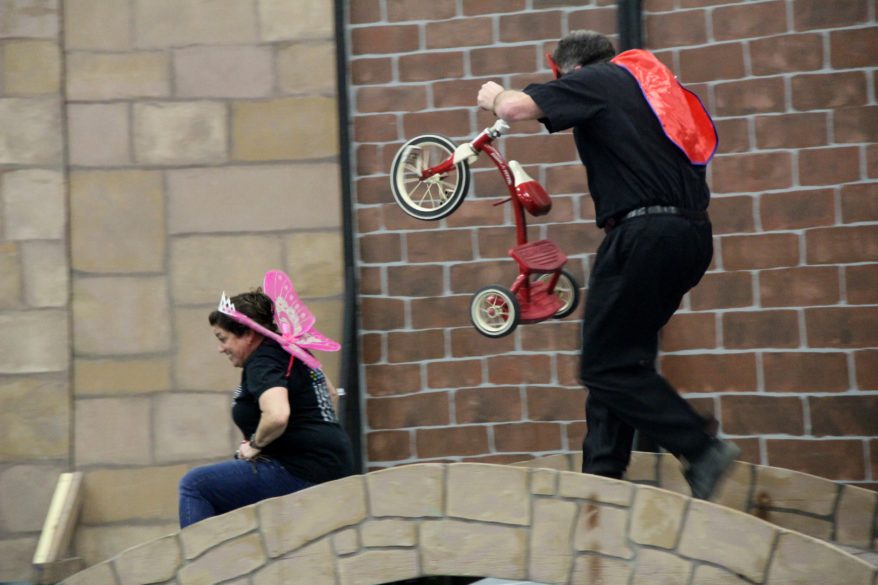
HOLLY SPRINGS – Holy Family
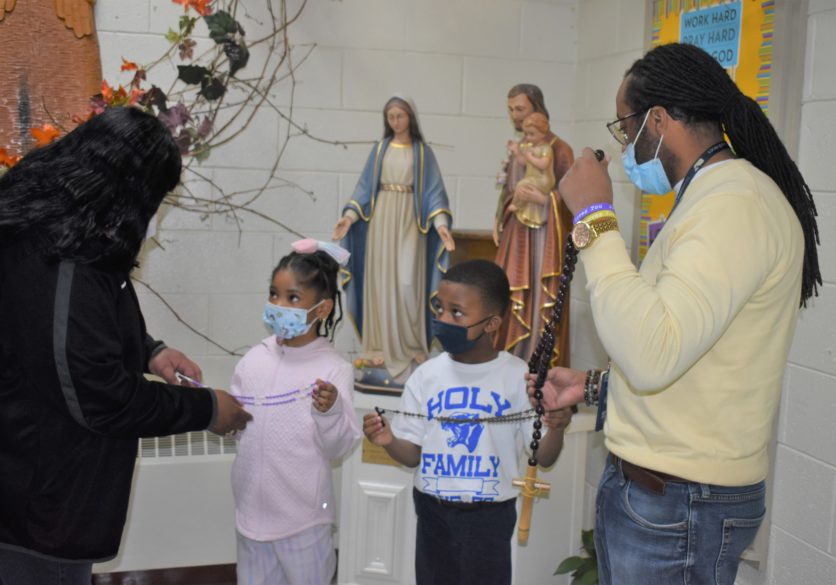


MERIDIAN – St. Patrick

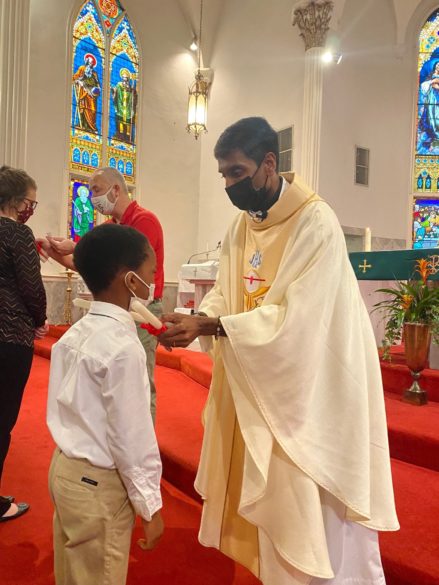

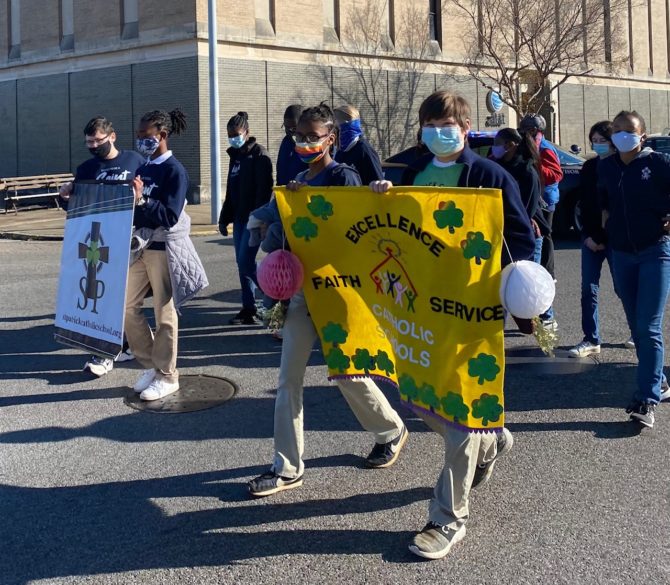

MADISON – St. Joseph
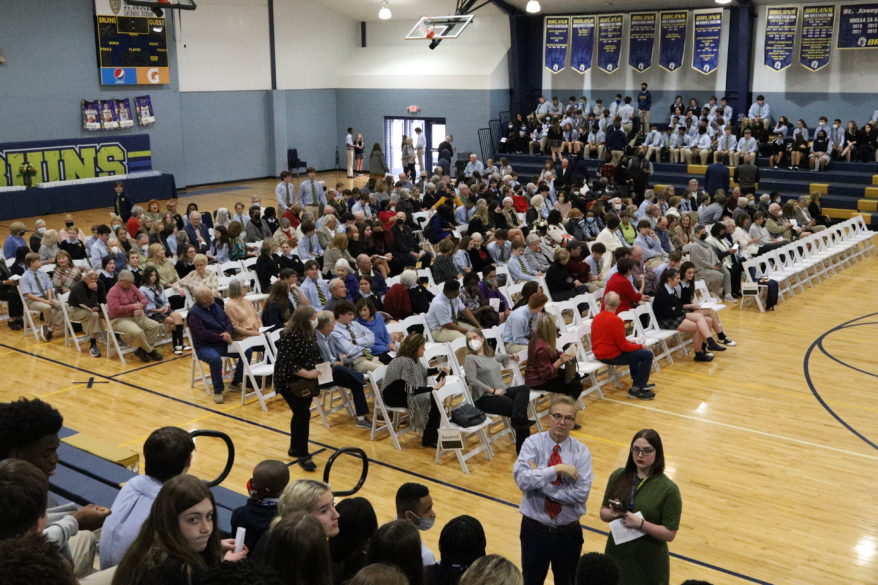


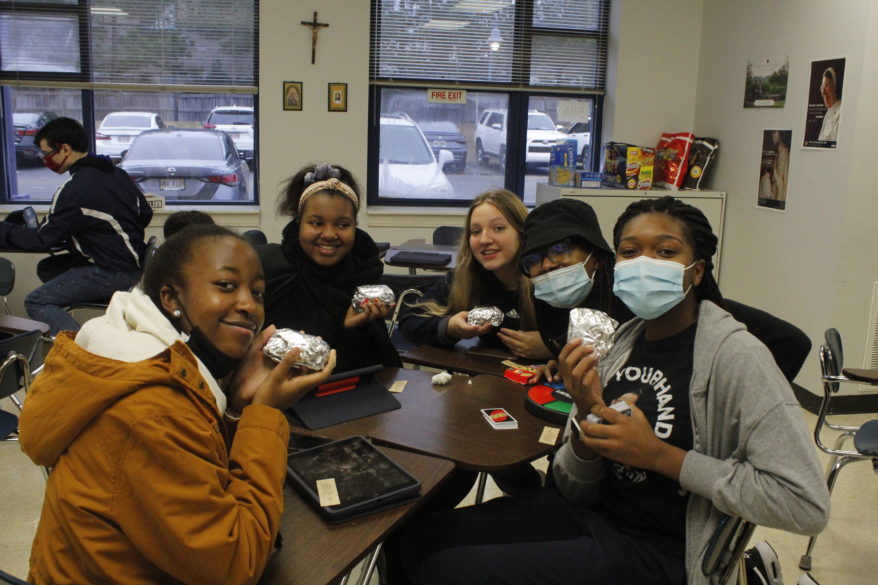
GREENWOOD – St. Joseph
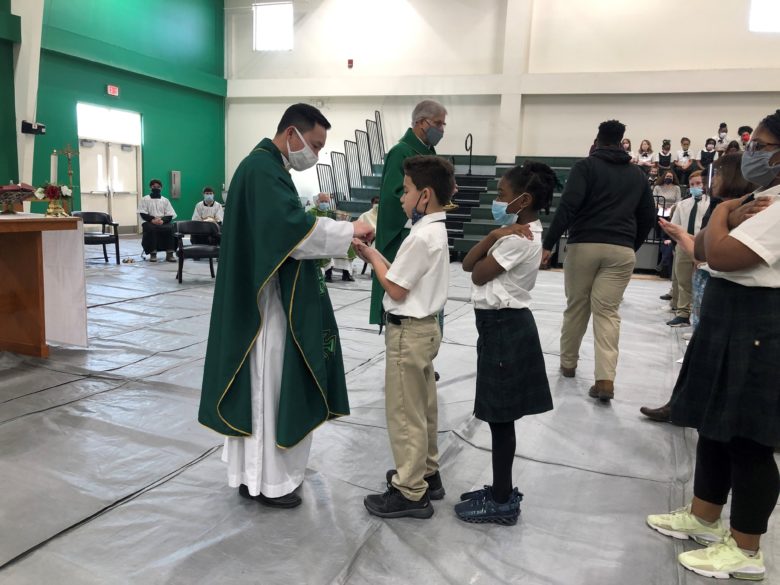

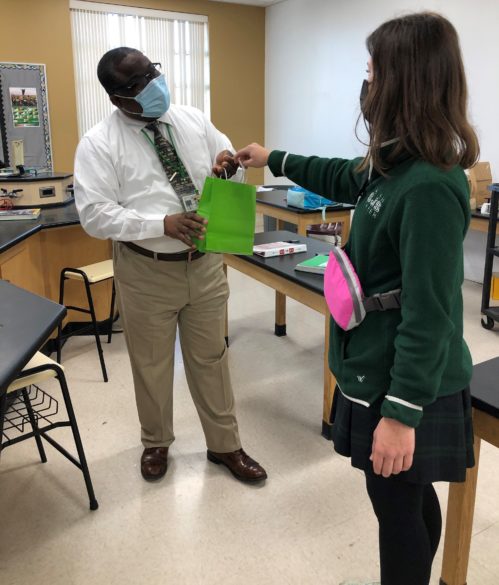
JACKSON – St. Richard
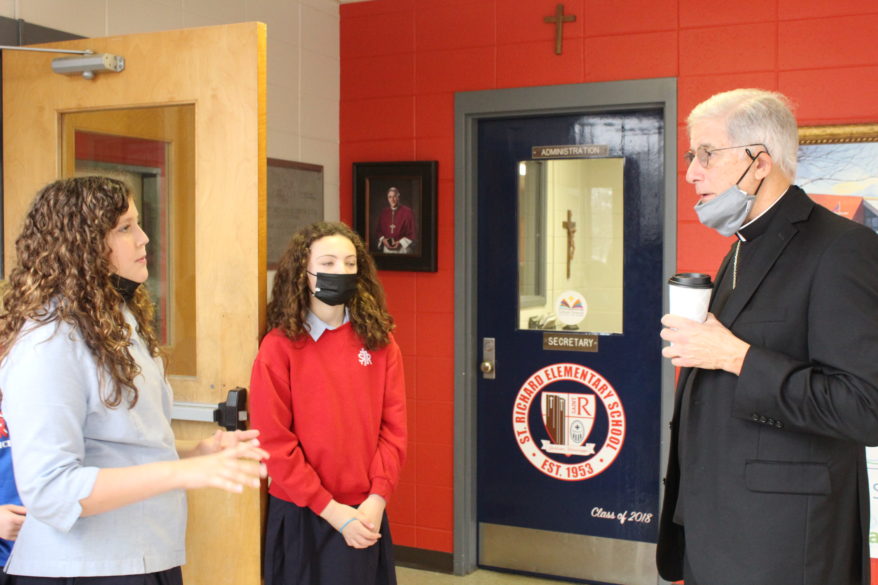
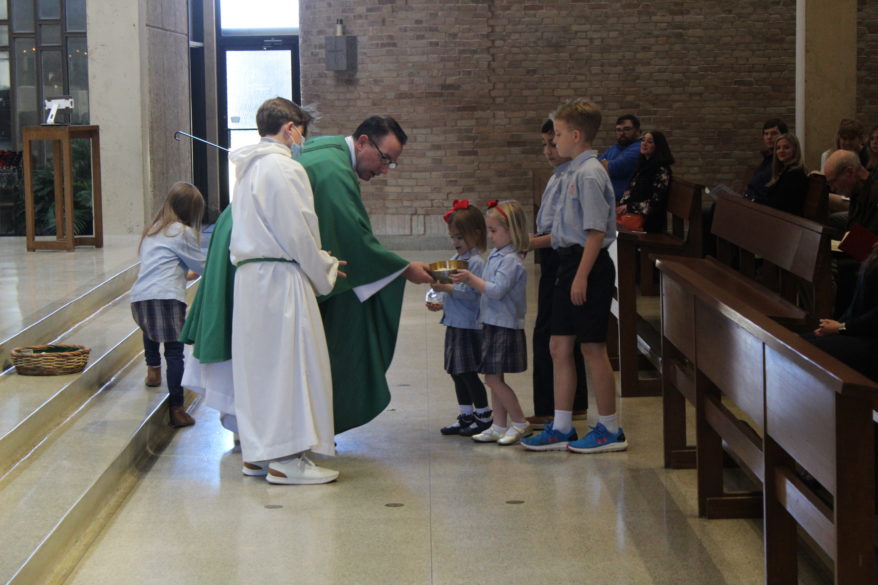
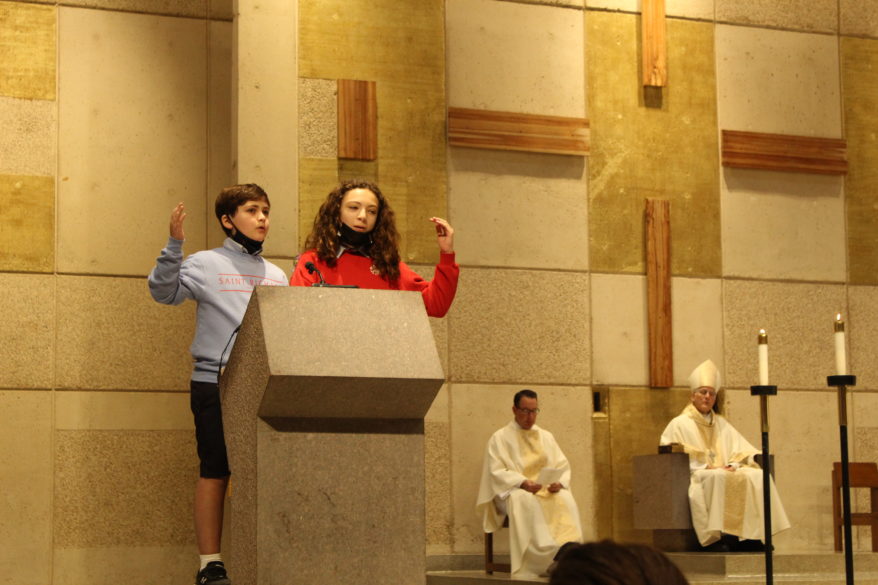
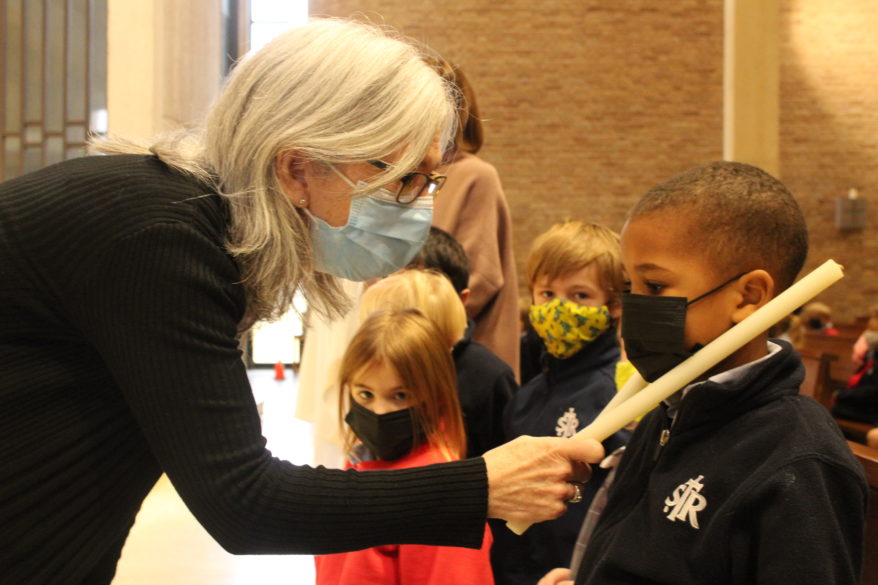
CLARKSDALE – St. Elizabeth
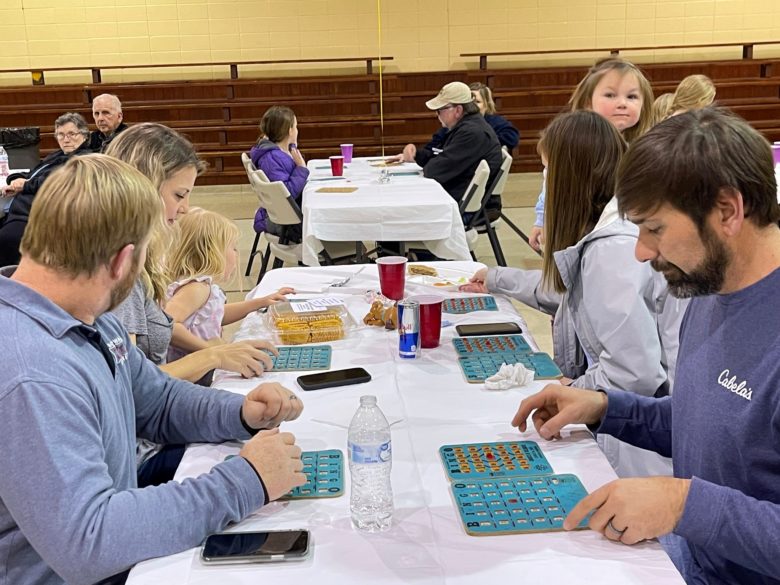

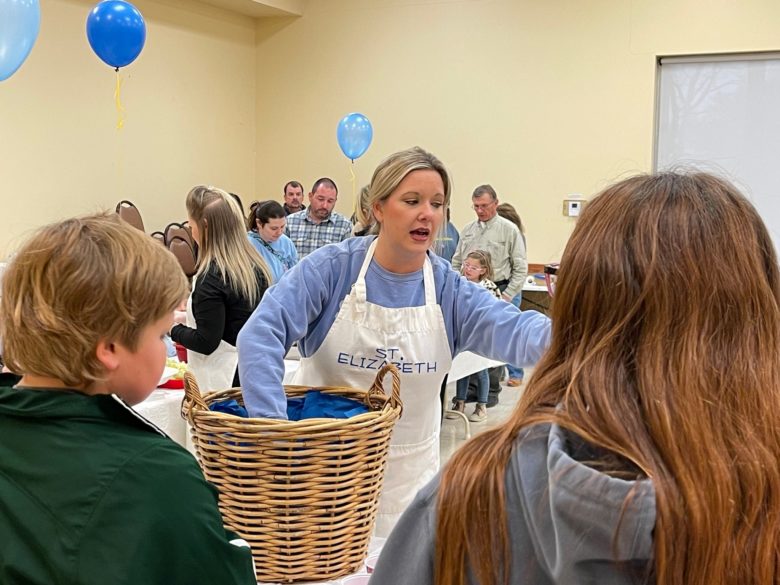
By Charlene Bearden and Joanna Puddister King
JACKSON – The Diocese of Jackson celebrated the anniversaries of married couples from around the diocese with a Mass celebrated by Bishop Joseph Kopacz on Sunday, Feb. 13 at the Cathedral of St. Peter the Apostle. According to World Marriage Day history, the idea of celebrating marriage began in Baton Rouge, Louisiana, in 1981, when couples encouraged the Mayor, the Governor and the Bishop to proclaim St. Valentine’s Day as “We Believe in Marriage Day.” The event was so successful, the idea was presented to and was adopted by Worldwide Marriage Encounter’s National Leadership.
By 1982, 43 Governors officially proclaimed the day, and celebrations spread to U.S. military bases in several foreign countries. In 1983, the name was changed to “World Marriage Day,” designated to be celebrated each year in February. In 1993, St. Pope John Paul II imparted his Apostolic blessings on World Marriage Day. World Marriage Day celebrations continue to grow and spread to more countries and faith expressions every year.
To honor couples in 2022, the Diocese of Jackson on behalf of the Office of Family Ministry asked parishes to submit the names of couples celebrating their 60th, 50th, 25th or any significant anniversary. This year, 60 couples from throughout the diocese submitted their names in celebration of their anniversaries.
At the World Marriage Day celebration at the Cathedral of St. Peter the Apostle, couples received an anniversary certificate blessed and signed by Bishop Kopacz.
Please join us in celebrating the anniversaries of the following couples:
60 Years
Johnnie and Ed Bartsek, St. Paul, Flowood
Jean and Virgil Campbell, St. John, Crystal Springs
Dale and James Cannon, Holy Savior, Clinton
Judy and Ron Despeaux, St. Joseph, Gluckstadt
Caroline and George Hoff, Holy Savior, Clinton
Glenda and Victor LaGarde, St. Paul, Vicksburg
Mary and William Marking, Holy Spirit, Hernando
Tammy and Gene McKinney, St. Joseph, Gluckstadt
Norma and Clinton Mixon, St. Joseph, Greenville
Joan and Neil Rhodes, St. Joseph, Gluckstadt
Linda and Stephen Smith, St. Mary Basilica, Natchez
Maureen and Clyde Staley, St. Paul, Flowood
50 Years
Gale and George Baroni, St. Joseph, Greenville
Linda and Tommy Biglane, St. Mary Basilica, Natchez
Cathy and Gene Bishop, Our Lady of Victories, Cleveland
JoAnn and Bob Burke, St. Paul, Flowood
Gwen and Lloyd Everhardt, St. Paul, Flowood
Betsy and Bobby Folsom, St. Michael, Vicksburg
Christine and Don Greer, Holy Spirit, Hernando
Valerie and James E. Hall, St. Richard, Jackson
Carolyn and Bill Johnson, Holy Savior, Clinton
Maureen and Gary Kippe, St. Joseph, Gluckstadt
Faye and Allen Lea, St. Jude, Pearl
Melissa and Sherwood Lyons, St. Paul, Vicksburg
Carol and Michael Maranto, St. Joseph, Greenville
Launo and John Moore, St. Michael, Vicksburg
Verginia and Michael Morlino, St. Joseph, Greenville
Connie and Jack Parker, St. Mary Basilica, Natchez
Carole and Arthur Ring, St. Francis of Assisi, Madison
Barbara and Joe Simmons, St. Joseph, Greenville
Ruth and John Thompson, St. Jude, Pearl
Janice and Dan Waring, St. Paul, Vicksburg
Janet and Ricky Warren, St. Mary Basilica, Natchez
25 Years
Marisa and Mark D. Briscoe, St. Joseph, Greenville
Judy and Stan Burkley, St. Mary Basilica, Natchez
Melanie and Scott DeJong, St. Joseph, Gluckstadt
Regina and Finley Hootsell, St. Mary Basilica, Natchez
Melinda and Allen Laird, St. Mary Basilica, Natchez
Ruth Ann and Paul Love, St. Joseph , Greenville
Jean and Ronald Smith, St. Basilica, Natchez
Stacy and Lee Vanlandingham, St. Jude, Pearl
Carol and Robert Walker, St. Francis of Assisi, Madison
Juliet and Jasin Wesberry, St. Mary Basilica, Natchez
Special Anniversaries
Sharon and John Aguzzi, Our Lady of Victories, Cleveland, 51 years
Corinne and Henry Anderson, Holy Family, Jackson, 61 years
Maria and Maxwell Beluso, Holy Savior, Clinton, 30 years
Madeleine and Jason Brown, St. Richard, Jackson, 10 years
Maureen and Nicholas Calico, St. Jude, Pearl, 51 years
Margaret and Mike Columbus, St. James, Leland, 61 years
Trudy and Dwight Fletcher, St. Jude, Pearl, 51 years
Judith and Ignacio Carillo, St. Peter, Jackson, 40 years
Maria Villa and Ljdefonso Ibale, Holy Savior, Clinton, 30 years
Judy and Jim Isonhood, St. Paul, Flowood, 51 years
Kelly and John McGregor, St. Jude, Pearl, 45 years
Marie and Peter Morris, Cathedral of Saint Peter the Apostle, Jackson, 55 years
Christina and David Overton, St. Jude, Pearl, 26 years
Anna and Jerry Roan, St. Jude, Pearl, 61 years
Emma and Dennis Santos, Holy Savior, Clinton, 35 years
Betsy and Benu Vargheese, Holy Savior, Clinton, 20 years
Tammy and Scott Waller, St. John, Crystal Springs, 42 years
By Bishop Joseph R. Kopacz, D.D.
Ash Wednesday awaits us in a few days, beginning the 40-day spiritual journey for our Catholic world. It is a spiritual undertaking, yet there is nothing vague or aimless about the precious time ahead because the Lord provides the framework on Ash Wednesday with the imperatives of prayer, fasting and almsgiving. Taken together these three pillars, especially magnified during Lent, allow the Holy Spirit to bring about the inner conversion that is life-long, with its outer manifestation in a faithful, compassionate and generous way of living.
Of course, each year the ultimate goal of this venerable 40-day undertaking is to grow in the love of Jesus Christ, the crucified and resurrected Good Shepherd who is the way, the truth and the life. Following a wholehearted Lenten observance, the Easter Sunday renewal of our Baptism vows is the extraordinary way of proclaiming this love in communion and solidarity with believers throughout our Catholic world. Banking on the Lord’s assurance, the 3-ply cord of prayer, fasting and abstinence will foster in us a keener awareness that we are God’s children now, and temples of the Holy Spirit.

Ash Wednesday takes us back to the basics of our faith with the admonitions during the distribution of ashes to “turn away from sin and be faithful to the Gospel,” or “remember, that you are dust and to dust you shall return.” Taken together they profess the fundamental reality that sin and death hold us in their grasp. The way out is the call to repentance that rests upon the fundamental teaching of our faith which we know as the Kerygma.
We recall the words of St. Peter, the inaugural proclamation of the Gospel on Pentecost Sunday because we want to respond to this call as if we were hearing them for the first time.
When they heard this, they were cut to the heart and said to Peter and the other apostles, “what are we to do brethren?’ Peter answered, “Repent and be baptized, every one of you in the name of our Lord Jesus Christ so that your sins may be forgiven, and you will receive the gift of the Holy Spirit. For the promise that was made is for you, for your children, and for all those who are far away, for all whom the Lord our God will call.” (Acts 2:37-39)
A faithful response to the call to conversion impacts who we are and all that we do. For example, how does all of this apply to the diocesan wide and worldwide process for the Synod on Synodality? Consider, that the Lord’s call to repentance is rooted in metanoia, the concept that describes the changing of one’s mind and going in another direction. Dialogue, based in prayer, the Word of God, and God’s Holy Spirit, the framework for our Synodal process, depends upon each one of us putting our sin-stained minds aside, our preconceived notions, our prejudices, our egos, our pride and our sinfulness in order to arrive at a higher level of communion, participation and mission as members of the Catholic Church.
It’s true that our broad-based diocesan response to the Synod on Synodality about to conclude its first phase, will bear much fruit in the future. At the deepest level, perhaps imperceptibly it is planting the seeds of conversion, or metanoia, a change of mind and behavior toward greater openness to one another in the Holy Spirit. A healthy process of participation and communion can inspire a change of heart, and in turn an individual’s conversion can be a stream of clean water that refreshes the body. This is our prayer.
Prayer: the turning of our hearts and minds to God; fasting: the letting go of that which is harming us, as well as sacrificing simple pleasures for a greater good; and almsgiving: the sacrificial generosity for the good of others, and for our own conversion, are the weapons of the spirit, and the medicine for much that ails us. They are more accessible than over the counter drugs and served up on demand without the need to download an app.
“May the Lord of peace himself give you peace at all times and in every way. The Lord be with you all.” (2Thessalonians 3:17)
Por Obispo Joseph R. Kopacz, D.D.
El Miércoles de Ceniza nos espera en unos días, dando inicio a la jornada espiritual de 40 días de nuestro mundo católico. Es una empresa espiritual, pero no hay nada vago o sin rumbo en el precioso tiempo que se avecina porque el Señor proporciona el marco del Miércoles de Ceniza con los imperativos de la oración, el ayuno y la limosna. En conjunto, estos tres pilares, especialmente magnificados durante la Cuaresma, permiten que el Espíritu Santo realice la conversión interior que dura toda la vida, con su manifestación exterior en una forma de vida fiel, compasiva y generosa.

Por supuesto, cada año el objetivo final de esta venerable empresa de 40 días es crecer en el amor de Jesucristo, el Buen Pastor crucificado y resucitado que es el camino, la verdad y la vida. Después de una observancia de Cuaresma de todo corazón, la renovación de nuestros votos bautismales del Domingo de Pascua es la forma extraordinaria de proclamar este amor en comunión y solidaridad con los creyentes en todo nuestro mundo católico. Confiando en la seguridad del Señor, el cordón de tres capas de oración, ayuno y abstinencia fomentará en nosotros una conciencia más aguda de que ahora somos hijos de Dios y templos del Espíritu Santo.
El Miércoles de Ceniza nos lleva de regreso a los fundamentos de nuestra fe con las advertencias durante la distribución de las cenizas de “apartaos del pecado y sed fieles al Evangelio” o “recordad que polvo sois y al polvo volveréis”. En conjunto, profesan la realidad fundamental de que el pecado y la muerte nos tienen en sus manos. La salida es el llamado al arrepentimiento que descansa sobre la enseñanza fundamental de nuestra fe que conocemos como el Kerygma.
Recordamos las palabras de san Pedro, cuando dijo las palabras inaugurales del Evangelio del domingo de Pentecostés, porque queremos responder a esta llamada como si las escucháramos por primera vez.
“Cuando los allí reunidos oyeron esto, se afligieron profundamente, y preguntaron a Pedro y a los otros apóstoles: — Hermanos, ¿qué debemos hacer? Pedro les contestó: “Vuélvanse a Dios y bautícese cada uno en el nombre de Jesucristo, para que Dios les perdone sus pecados, y así él les dará el Espíritu Santo. Porque esta promesa es para ustedes y para sus hijos, y también para todos los que están lejos; es decir, para todos aquellos a quienes el Señor nuestro Dios quiera llamar.” (Hechos 2:37-39)
Una respuesta fiel al llamado a la conversión impacta quiénes somos y todo lo que hacemos. Por ejemplo, ¿cómo se aplica todo esto al proceso diocesano y mundial para el Sínodo sobre la Sinodalidad? Considere que el llamado del Señor al arrepentimiento tiene sus raíces en la metanoia, el concepto que describe el cambio de mentalidad y el ir en otra dirección. El diálogo, basado en la oración, la Palabra de Dios y el Espíritu Santo de Dios, marco de nuestro proceso sinodal, depende de que cada uno de nosotros dejemos de lado nuestras mentes manchadas por el pecado, nuestras ideas preconcebidas, nuestros prejuicios, nuestros egos, nuestro orgullo y nuestra pecaminosidad para llegar a un nivel superior de comunión, participación y misión como miembros de la Iglesia Católica.
Es cierto que nuestra amplia respuesta diocesana al Sínodo sobre la Sinodalidad, que está a punto de concluir su primera fase, dará muchos frutos en el futuro. En el nivel más profundo, tal vez imperceptiblemente, está plantando las semillas de la conversión, o metanoia, un cambio de mentalidad y comportamiento hacia una mayor apertura mutua en el Espíritu Santo. Un proceso sano de participación y comunión puede inspirar un cambio de corazón y, a su vez, la conversión de una persona puede ser un chorro de agua limpia que refresca el cuerpo. Esta es nuestra oración.
Oración: la vuelta de nuestros corazones y mentes a Dios; el Ayuno: dejar ir lo que nos está dañando, así como sacrificar los placeres simples por un bien mayor; y la Caridad: la generosidad sacrificial por el bien de los demás, y por nuestra propia conversión, son las armas del espíritu, y la medicina para mucho de lo que nos aflige. Son más accesibles que los medicamentos de venta libre y se sirven a pedido sin necesidad de descargar una aplicación.
“Y que el mismo Señor de la paz les dé la paz a ustedes en todo tiempo y en todas formas. Que el Señor esté con todos ustedes.” (2 Tesalonicenses 3:16)
By Carol Glatz
VATICAN CITY (CNS) – A disciple of Jesus leaves behind worldly attachments and prejudices to follow God completely, Pope Francis said.
Disciples “know how to question themselves, how to humbly seek God every day,” the pope said Feb. 13 during his Sunday Angelus address.
With a crowd gathered in St. Peter’s Square for the midday Angelus prayer, the pope reflected on the Sunday Gospel reading from St. Luke in which Jesus delivers the sermon on the plain, which, like St. Matthew’s sermon on the mount, begins with the beatitudes.
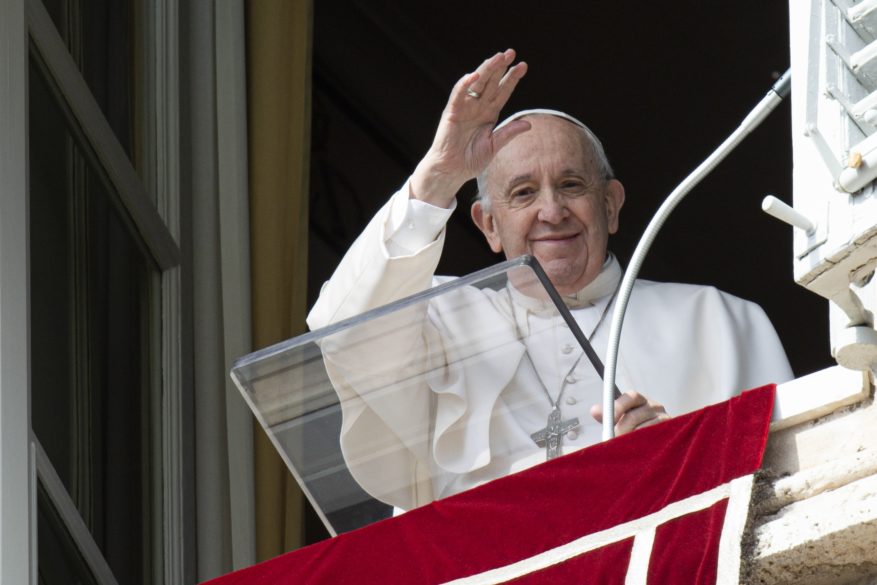
“Indeed, the beatitudes define the identity of the disciple of Jesus,” Pope Francis said.
The beatitudes may sound strange, “almost incomprehensible to those who are not disciples,” he said.
According to the logic of the world, “happy are those who are rich,” who receive praise, are envied and feel secure, he said; but the beatitudes say that those who are poor and lack material possessions are blessed and happy.
Jesus “declares worldly success to be a failure, since it is based on a selfishness that inflates and then leaves the heart empty,” he said.
“Faced with the paradox of the beatitudes, disciples allow themselves to be challenged, aware that it is not God who must enter into our logic, but we into his,” the pope said.
“This requires a journey, sometimes wearisome, but always accompanied by joy. Because the disciple of Jesus is joyful, with the joy that comes from Jesus,” from the Lord who frees “us from the slavery of self-centeredness, breaks our locks, dissolves our hardness.”
Disciples, he said, “are those who let themselves be led by Jesus, who open their heart to Jesus, who listen to him and follow his path.”
By Joanna Puddister King
JACKSON – Rhonda Bowden is a name that may ring a bell to some around the diocese. In 2008, she began working at St. Jude parish in Pearl as the coordinator for liturgy and pastoral care; and her son Deacon Andrew Bowden is set to be ordained for the priesthood this summer.
Bowden says that the 13 years she spent at St. Jude was such a blessing, as she walked with families through the loss of loved ones, assisted couples planning weddings, coordinated weekend and special liturgies, helped parishioners in need and worked with RCIA participants.
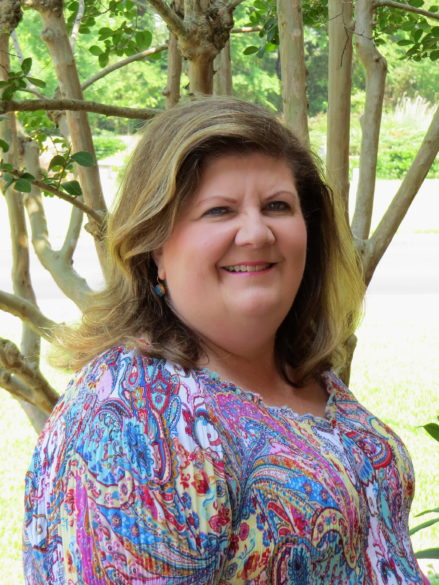
However, the sudden loss of her dear friend and St. Jude’s faith formation director, Stacy Wolf left Bowden grief-stricken and feeling that she had lost her passion for ministry. She felt that a change was needed when God put the position for a tribunal office manager for the Diocese of Jackson in front of her.
“Despite the many twists and turns, God has proven again that His plan for me is much better than anything I could possibly dream up,” said Bowden.
“The job description was an interesting amalgamation of skills and knowledge that I had gained through my past work and ministry experience – accurate record keeping, confidentiality, good communication and organization,” said Bowden. “It tied together my interest in law (cannon versus civil), gave me an opportunity to help others with the healing that often comes with the annulment process and challenged me to learn something new.”
Bowden takes the place of long-time diocese employee, Fabvienen Taylor, who retired at the end of December 2021. “She has been so helpful in teaching me about the work of the office,” said Bowden.
After joining the tribunal office in January, Bowden says that she looks forward to working with judicial vicar, Father Jeffery Waldrep, to streamline procedures to make it easier for those seeking an annulment from the church.
“I hope that we can maintain good communication with the priests that act as advocates and offer educational information for the laity for a better understanding of the entire process.”
Bowden is married to her husband, Mark, who owns Bowden Technical Services and is set to be ordained in July to the permanent diaconate; her son, Andrew is to be ordained to the priesthood in May; and her daughter, Laura, teaches special ed at Pearl High School.
By Catholic News Service
LOUISVILLE, Ky. (CNS) – Archbishop Shelton J. Fabre, the newly appointed archbishop of the Archdiocese of Louisville, celebrated a Mass at Holy Family Church Feb. 8, saying to the congregation that his prayer for the archdiocese – his new home – is that “we will grow in our love for God and grow in our love for each other. To do so is a response to God who is laboring in every moment to love us first,” said Archbishop Fabre.
During the liturgy, Archbishop Joseph E. Kurtz – who has led the archdiocese since 2007 – welcomed Archbishop Fabre, calling the news of his appointment “joyous.”
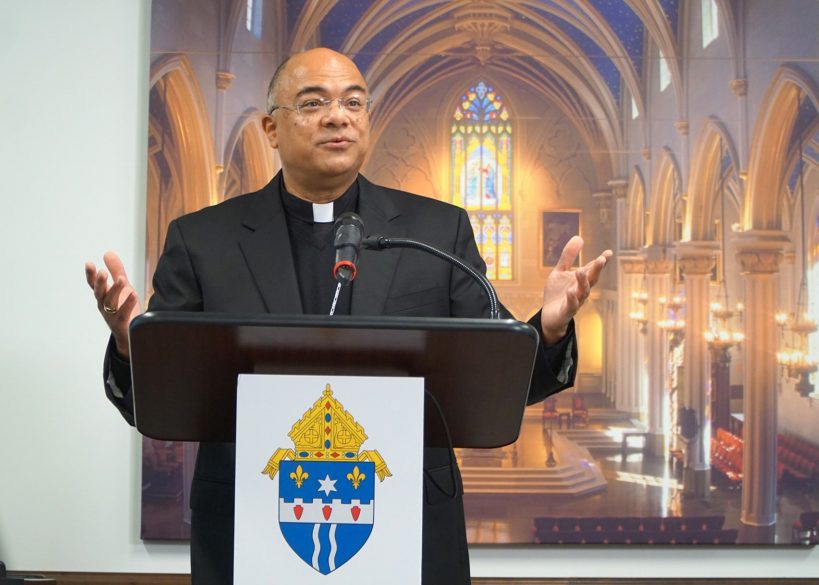
Archbishop Kurtz said he has known Archbishop Fabre for many years. “He’s a good friend of mine and he will be a good friend of yours,” said Archbishop Kurtz.
During the homily, Archbishop Fabre shared that between leaving his Louisiana home and coming to Louisville, his heart is divided.
“It delights me to be here today to greet this new home that is mine. It’s my honor and privilege to serve you, the good people of the Archdiocese of Louisville,” he said.
“I welcome this opportunity to meet you and yet my heart is divided for my family in Thibodaux who is learning today of the news that I am not with them. So my heart is divided today and I acknowledge that.”
Archbishop Fabre is not only leaving the members of the clergy, religious and faithful in the Diocese of Houma-Thibodaux, Louisiana, which he has led since 2013, he’s also leaving his siblings, he said.
Following the Mass, Archbishop Fabre held a news conference at the Archdiocese of Louisville Pastoral Center, where he spoke to members of the media and answered questions.
He will be installed as the fifth archbishop of Louisville March 30 at the Kentucky International Convention Center in downtown Louisville.
By Catholic News Service
WASHINGTON (CNS) – Pope Francis has accepted the resignation of Archbishop Joseph E. Kurtz of Louisville, Kentucky, and appointed as his successor Bishop Shelton J. Fabre of Houma-Thibodaux in southeastern Louisiana.
Archbishop Fabre, 58, is one of 12 of the U.S. Catholic Church’s African American prelates and he will be the first Black archbishop of Louisville. The newly named archbishop has headed the Louisiana diocese since 2013. He previously served as an auxiliary bishop of the Archdiocese of New Orleans from 2006 to 2013. He is chairman of the U.S. bishops’ Ad Hoc Committee Against Racism.
Archbishop Kurtz turned 75 Aug. 18, 2021, and as required by canon law, he turned in his resignation to the pope when he reached 75. He has headed the Louisville Archdiocese since August 2007.
The changes were announced Feb. 8 in Washington by Archbishop Christophe Pierre, apostolic nuncio.
Archbishop Fabre’s episcopal motto is “Comfort My People,” which he chose when he was ordained a bishop in 2007 as an auxiliary of New Orleans. He helped with rebuilding efforts that followed the devastation of Hurricane Katrina in 2005.
Eight years later, he was appointed the bishop of Houma-Thibodaux. In August 2021, his diocese and other parts of southern Louisiana suffered devastation wrought by Hurricane Ida.
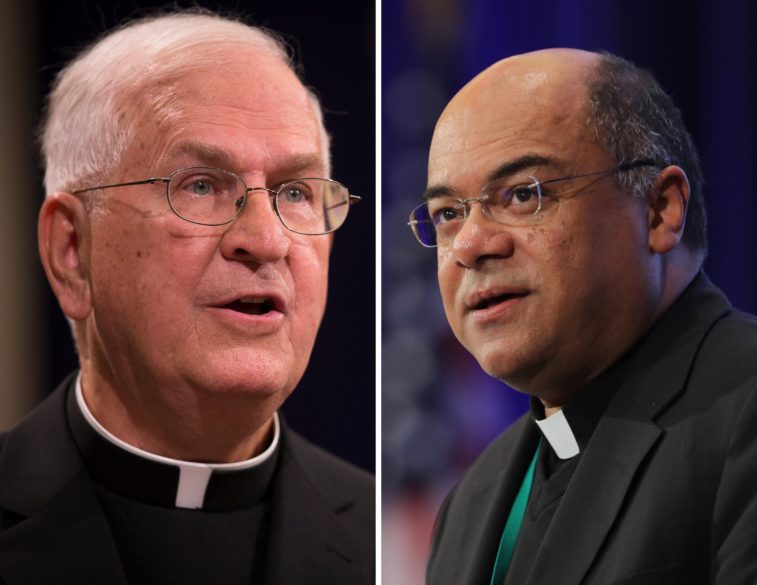
Regarding his motto, he said in a Feb. 8 statement that the words “are dear to my heart because they capture what I have always desired to do as a bishop, as a pastor of souls. I sincerely believe our Lord is communicating these words to his people right now.”
Shelton Joseph Fabre was born Oct. 25, 1963, in New Roads, Louisiana, the fifth of six children. He graduated in 1981 as valedictorian of Catholic High School of Pointe Coupée, Louisiana. He entered St. Joseph Seminary College in St. Benedict, Louisiana, graduating with a bachelor’s degree in history in 1985.
He continued his studies in Belgium at the American College in Louvain, a seminary that was affiliated with the Catholic University of Leuven, Belgium. He earned a bachelor of religious studies degree in 1987 and a master of religious studies degree in 1989 from the Catholic university.
He was ordained a priest for the Diocese of Baton Rouge, Louisiana, Aug. 5, 1989, and went on to serve as a pastor and associate pastor. He also served as a chaplain at Louisiana State Penitentiary at Angola, defender of the bond for the diocese’s marriage tribunal and dean of the diocese’s Northwest Deanery.
He also served on the diocesan priests’ council, college of consultors, school board and clergy personnel board. He was chairman of pastoral planning and director of the Office of Black Catholics.
As chairman of the bishops’ Ad Hoc Committee Against Racism, Archbishop Fabre led the writing of “Open Wide Our Hearts – The Enduring Call to Love,” approved by the body of bishops in 2018.
In March 2021, Archbishop Fabre discussed the pastoral with about 150 people in the Archdiocese of Louisville when he led an Archdiocesan Leadership Institute on the subject.
During the event, conducted online due to the pandemic, he centered his talk on “witnessing to the dignity of the human person as an antidote to the grave sin of racism.”
The following month, he and Archbishop Paul S. Coakley of Oklahoma City, chairman of the U.S. Conference of Catholic Bishops’ Committee on Domestic Justice and Human Development in a joint statement urging Catholics to “join in the hard work of peacefully rebuilding what hatred and frustration has torn down.”
“This is the true call of a disciple and the real work of restorative justice,” Bishop Fabre and Archbishop Coakley said. “Let us not lose the opportunity to pray that the Holy Spirit falls like a flood on our land again, as at Pentecost, providing us with spiritual, emotional and physical healing, as well as new ways to teach, preach, and model the Gospel message in how we treat each other.”
The two chairmen’s statement followed the jury’s April 20, 2021, verdict finding former Minneapolis police officer Derek Chauvin guilty in the death of George Floyd.
Archbishop Fabre is a former chairman of the USCCB’s Subcommittee on African-American Affairs and currently serves on the board of Catholic Relief Services, the U.S. bishops’ overseas relief and development agency.
As the archbishop of Louisville, he will shepherd about 156,000 Catholics in 24 counties of central Kentucky, from the Ohio River to the Tennessee border. The archdiocese, which dates to 1808, has 110 parishes that cover 8,124 miles. About 20,000 students are served by 48 schools from kindergarten to high school.
(Contributing to this story was Marnie McAllister, editor of The Record, newspaper of the Archdiocese of Louisville.)